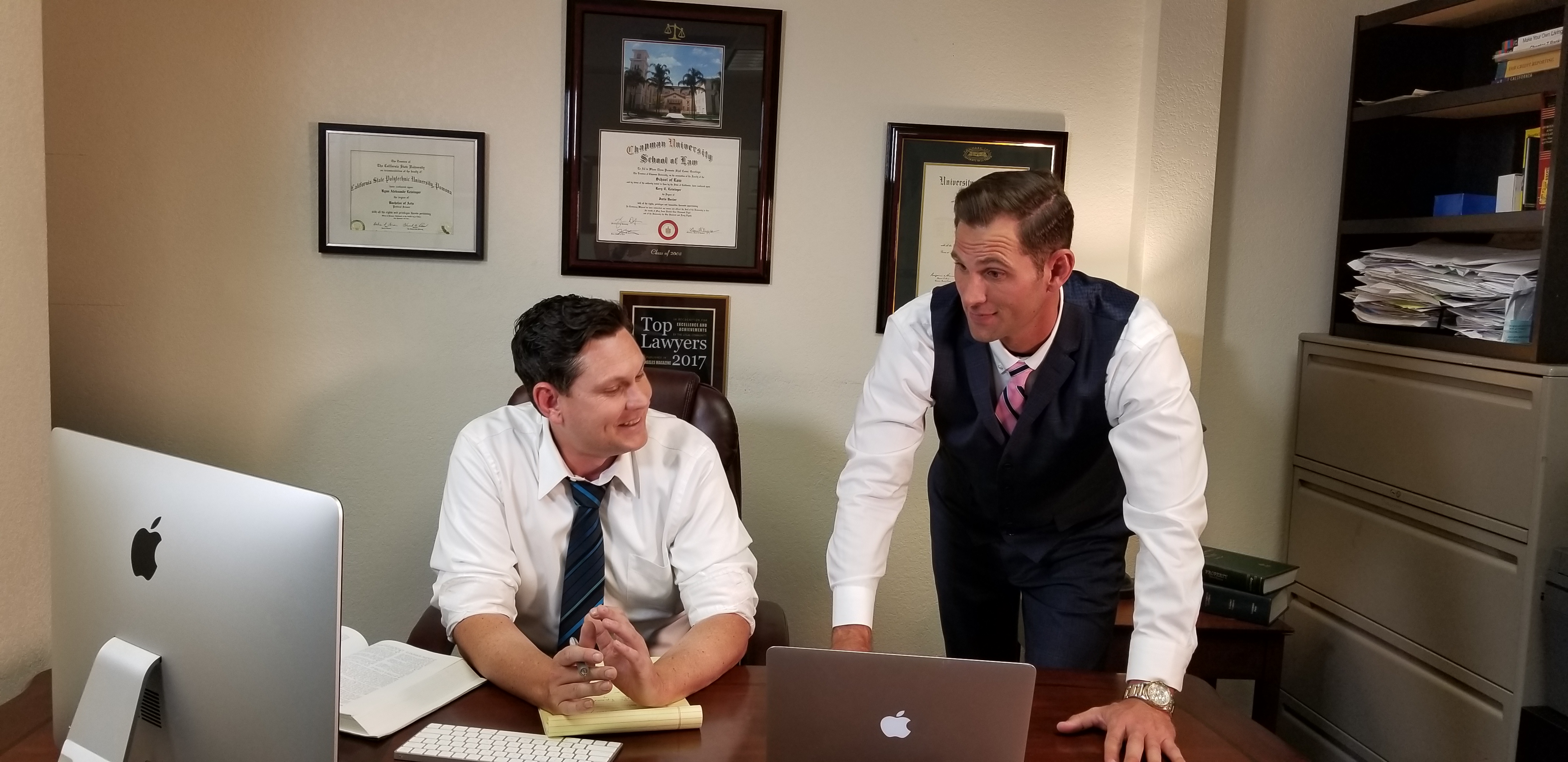Estate Planning Is More Important Than You Think
Estate planning ensures financial security for your loved ones if something should happen to you by protecting your hard-earned assets – such as your home, investments, retirement accounts and life insurance.
An estate plan is a necessary tool that allows you to protect, maintain and manage your property if you become ill or pass away. But more than that, it can also help people make sure their minor children are protected in the event of an emergency or minimize taxes paid on assets by beneficiaries.
With proper planning, probate can even be avoided so that your beneficiaries receive your assets in a way that’s controlled by you and not by attorneys, the government or the IRS.
Not too long ago, we hosted an estate planning workshop and noticed a common issue with those that attended. A substantial portion were already in their mid-60s and several others were over the age of 80. That’s alarming considering some of their comments, including misconceptions and reasons for delaying.
So, why do so many hardworking people fail to take the time and effort to build an estate plan and preserve their hard-earned assets?
Misconceptions in Estate Planning
To begin with, a common misconception most people have is that estate planning is for those who are older or possess substantial wealth. Many people also assume that the process will be complex, time intensive and pricey. But some — if not all — of the problems mentioned aren’t true the majority of the time.
Here are a few steps you can take to begin thinking about your estate plan:
- Gather important documents, and make sure that key family members know where they are.
- Gather a list of all the things you own, noting any liabilities (like your mortgage) as well. Record the value of each asset (properties, collectibles, jewelry, etc.). Print copies of your most recent statements from your relevant accounts. Note the values and benefits from insurance policies.
- Consider and write down your objectives for your estate plan. Who should get which assets? Who should get them if something should happen to your beneficiaries? Do you have minors who need care if something were to happen right now? Who should handle your assets if you become unable to make decisions about them? And so forth.
- Review your will, if you have one in place.
- Review and update the beneficiaries of your retirement accounts or insurance policies.
- Review and update powers of attorney for matters of health care or other affairs.
- Consider if you want to establish a trust, and prepare to talk to an attorney and experienced financial adviser about it.
By using a will or trust to legally ensure that you will not only protect the things you worked hard to achieve, you will have the final say about those assets — taking care of the people you love when you’re no longer here. That means not leaving such decisions to attorneys, the government or the IRS.
In some instances, it may be as simple as meeting with an attorney and preparing your documents, such as a will, power of attorney and trust. However, depending on if there are more complex assets, such as a business interests, different investments, retirement accounts or real estate, you may need more guidance on the appropriate strategies, including charitable giving, life insurance for business succession, and either living or irrevocable trusts.
An estate planning attorney would then make sure what you decide to do is complete to the full extent of the law and that you aren’t missing any important documents, so that everything will go through according to your wishes.
Revocable vs. Irrevocable Trusts
Trusts are a powerful and beneficial tool when properly used. There are two types of trusts: a revocable living trust and an irrevocable trust. Some other terms associated with trusts include “grantor” and “non-grantor” — which are the parties creating the trust.
With a revocable living trust, you still control the assets, can change the trustee at any time, or sell your assets while you’re living, because the grantor — the person who created the trust — is normally the trustee as well. The only benefit a revocable living trust provides is to ensure your assets bypass probate. It does not provide any immediate tax benefits. In fact, income from a revocable living trust is taxed to the grantor.
An irrevocable trust is completely different. It can be used when “gifting” assets in order to reduce a grantor’s taxable estate. Be aware that once you transfer assets to an irrevocable trust, changes are permanent and cannot be undone — or at best — can only be made through a lengthy process. You no longer have any control to sell investments inside the trust and will have to ask your trustee — typically your children or grandchildren — to do so. Since you don’t legally own the assets any longer, they’re either taxed at trust income tax rates or your beneficiaries’ tax rates.
The Coronavirus Should Have You Thinking About These 4 Things
The global COVID-19 outbreak has everyone thinking about what could happen if the disease spreads more fully across the general population. Despite best efforts to contain the outbreak, people in dozens of countries around the world have contracted the virus. That points to the need for people to plan for whatever could possibly happen.
Nobody likes to think about their own mortality, and that’s why so many people go without basic estate planning documents. Often, an event like the coronavirus can be the kick in the pants you need to get your affairs in order. To protect yourself and your loved ones, now’s a good time to make sure that you have the following four documents prepared and updated.
1. A will or revocable trust
Making sure that your assets will pass to the loved ones you want to receive them after your death is critical during crisis times. You don’t want to make things any more difficult than they need to be, and avoiding costly and time-consuming processes like probate takes on heightened importance when your family might end up confined to their homes in a quarantine situation.
Many people have wills to cover what happens to their assets at death, and that typically works well, especially for modest estates. State laws differ with regard to how complicated it is to go through a probate administration process with a basic will, though, so some people prefer to use a revocable trust that doesn’t require probate. Whichever vehicle you choose, make sure that its provisions are up to date and reflect your current preferences and family situation.
2. Beneficiary designations on financial accounts
What many people don’t realize is that their will or revocable trust might not cover all of their assets. In particular, if you have an IRA, 401(k) account, or life insurance policy, the person you name as beneficiary of that account is who will receive the proceeds — even if it’s completely different from what your will or trust specifies. Moreover, many people fail to name any beneficiary for these accounts, creating additional complications in the event of their death.
Your financial provider will have the forms necessary to name a beneficiary for your accounts. Make sure to review those designation forms regularly, especially if a change in family situation makes updating them worthwhile. That way, you won’t face a situation in which someone you no longer want to receive your money ends up with it.
3. Healthcare durable power of attorney
Much more pressing during an outbreak is ensuring that you’ll be able to get the healthcare you need if you’re stricken with an illness. A durable power of attorney for healthcare will give the person you choose the ability to make whatever medical decisions you specify on your behalf.
If you’re already receiving care, then check with your healthcare provider to see what they prefer to see in a healthcare power of attorney to ensure a smooth transition if you’re no longer able to make your own healthcare decisions. Otherwise, an attorney can help you draft documents that will match up with your particular wishes.
4. Financial durable power of attorney
You can also name a person to help you take care of your finances if something leaves you incapacitated or otherwise unable to handle your financial affairs. A durable power of attorney for financial matters is a separate document from the healthcare power of attorney, but it similarly allows you to delegate responsibility and authority to make financial transactions to the person you choose.
You can tailor your financial power of attorney as narrowly or broadly as you want, ranging from just being able to pay bills on your behalf to making major changes to your investment strategy. The position requires great trust, but having someone who can step in on your behalf can be invaluable in times of volatile markets.
Be ready for anything
Doing estate planning is never fun, but the coronavirus outbreak has many people thinking about what they need to do. By making estate planning part of your broader retirement planning, you’ll be able to ensure that your loved ones will have what they need even if something happens to you.
Contact The Trust Brothers Today!
(626) 331-1515
Nesting During COVID-19: Clean Your Closets And Do Your Estate Planning
 Write and execute your last wills and testaments, powers of attorney, and health care proxies.
Write and execute your last wills and testaments, powers of attorney, and health care proxies.
COVID-19 and the resulting social distancing and self-quarantining have caused health, child, and financial issues prompting palpable anxiety, fear, and concern. It has also brought nuclear families closer, resulting in a multitude of activities to make time spent at home as active and as meaningful as possible, including online learning, movie marathons, and good old-fashioned board games. There are multitudes of online workshops, including Continuing Legal Education courses, giving direction during these trying times, when personal contact is recommended and sometimes demanded.
The streets of my leafy suburb are lined with folded cardboard boxes and bags of trash. It would seem that in these strange times people have been “nesting,” the term used to describe cleaning and organizing before the birth of a child. Social distancing has resulted in overwhelming and unexpected hours at home. Closets not recently opened, basements rarely entered, and crawl spaces never explored have become mini travel destinations for those who find themselves getting to know every inch of the houses they work so hard to pay for and maintain, but never get to appreciate enough.
Given the medically based impetus for this current societal and home-based lifestyle, what better time to deal with estate planning? As a trusts and estates practitioner, I often get phone calls around the new year when people make resolutions to get their affairs in order. Similarly, when tragedy strikes, such as the death of a celebrity (Kobe Bryant, for example) people realize the fragility of life. So too, as each day brings more closures and more quarantines, the need for estate planning becomes more real.
At a minimum every adult needs a last will and testament, power of attorney, and health care proxy. The last will and testament, drafted by an attorney, will direct the disposition of your assets and the guardianship of your children in the event you die. In the event you die without a last will and testament, the state intestate laws dictate the beneficiaries of your assets, and a judge will determine who gets custody of your minor children. A trustee may also be appointed under one’s will to manage the inheritance of a minor child.
A power of attorney authorizes an agent to stand in your place regarding financial matters in the event you are unable to act. Such activities include filing taxes, banking, purchasing and selling real estate, and filing for governmental benefits. A health care proxy is used when you are unable to make medical decisions for yourself. As such, it is imperative that your wishes are known to your appointed agent in the event you cannot speak for yourself. Other concerns for estate planning include checking beneficiary designations, purchasing life insurance, and speaking with the elders in your family about their estate planning.
Many attorneys are now working from home and have the ability to “meet” with clients telephonically or via internet. For estate planning, this practice works very well. Zoom, Facetime, and conference calls are all good mechanisms for discussing matters pertaining to a last will, power of attorney, and health care proxy. In most states, however, the document signing must be in person before a notary and witnesses. Nonetheless there should be little impediment to doing the legwork for estate planning: discussing the documents, contemplating appointments, and finally drafting and reviewing. In these unique times when individuals may have more flexibility or, perhaps, time in terms of dealing with their own matters, perhaps we can move estate planning up a few pegs on life’s to-do list. Let us take advantage of these nesting times by not only physically cleaning and organizing our households, but mentally and legally preparing for our futures, in good health and safety.
Greed is Good: It is Your Money to Lose
Let’s Be Honest, Who Really Benefits from a Well-Planned Estate?
A lot of attorneys out there are putting the guilt trip on “Parent’s”, reminding them that, if they don’t put an estate plan in place soon, their loved ones will be out of luck in the future. The standard narrative is this: 1) Get an estate plan. 2) Feel peace of mind knowing your loved ones are cared for. Of course, that sounds great, and a good number of people do end up getting their affairs in order just to feel like they’ve checked the box. BUT, let’s be honest, peace of mind isn’t a super persuasive pay-off. That’s why over 60% of Americans don’t even have so much as a will, let alone a probate avoidance estate plan.
Here’s the thing, you, not your parents, are the ones who will benefit from their probate avoidance estate plan. And you are also the ones with the most to lose. Do you really want to go through the process of probate? Do you really want to have to wait twelve to eighteen months just to receive a dime from your parents’ wealth? Do you want the details of everything you will inherit to be available on the public record? And do you really want to lose 3-6% of the total value of your inheritance right off the top? Of course you don’t.
Let’s do the math. Say your parents own a home that’s valued at $550,000. And maybe they have about $75,000 in stocks, $30,000 in cash, and a $17,000 car. In total, that’s a $672,000 estate. You will lose, right off the top, about $33,000. Then, if they still owe anything on their house or to any other creditors, those debts will have to be paid back, too. Plus any additional court costs, appraisal costs, attorneys fees, funeral costs, the list goes on and on.
Surprise! Estate Planning is Actually in Your Best Interest
Take it from us — probate is not fun and you stand to lose a lot of money in the process. But, there is a way to avoid it. A probate avoidance trust is a relatively simple set of legal documents that keeps your parents stuff out of probate. This kind of trust, alongside a standard will, is a secure way to ensure that you are able to inherit quickly, easily, and without the hassle and expense of probate when your parents pass. To us, it’s a no-brainer. Sure, setting up a probate avoidance trust costs a little money now, but it’s nothing compared to what you will save in the long run. Talk to your parents. If they aren’t willing to put up the money to create a trust, consider offering to pay for it yourself. After all, it’s your money to lose. Consider it an investment in your future.
Want to learn more about setting up a probate avoidance trust to protect your inheritance? Give the Trust Brothers a call at (626) 331-1515.
HOLDING REAL ESTATE IN CALIFORNIA Benefits of an LLC and a Trust
Owning investment properties can produce big rewards, but also big problems. This is why it is important to hold title to your property in the most beneficial way. A smart investor should consider using both a LLC and a trust to adequately protect himself and his property.
Countless individuals invest in real estate every day. Some dream of becoming the next real estate mogul, while others simply wish to supplement their salary with additional income. Whatever your motivations, owning investment properties can produce big rewards, but also big problems. This is why it is important to hold title to your property in the most beneficial way. The internet is saturated with various posts and articles touting the most effective techniques to manage your property. It can often be a daunting task weeding through the mass of information in an attempt to discern what advice is reliable and what advice can get you into trouble. Our goal here is to provide a succinct and clear summary of the safest and most important strategies for holding investment property in California. We hope the result will be a valuable starting point in considering the best ways to both protect you as the owner/landlord from liability and also guarantee the best treatment of your assets.
The Risks of Owning Real Estate
As stated above, while property can be a valuable investment, there are also significant risks. One of the biggest risks is lawsuits. From common slip and falls, to environmental contamination, landlords and owners are easily exposed to legal judgments. Landlords have also been successfully sued by victims of crimes — such as robberies, rape, and even murder — that occur on their property on the theory that the landlord provided inadequate security.
Options for Holding Real Estate
Faced with the risk of lawsuits, it is crucial that you do not own investment real property in your own name. (The only real property you should hold in your own name is your primary residence.) Thankfully, there are several ways in which an individual can hold property other than in his/her own name. These include as a corporation, limited partnership, limited liability company (“LLC”), trust, and many others.
While there are many options, when it comes to real estate investment, LLCs are the preferred entity by most investors, attorneys and accountants.
For many reasons, few investors hold investment real estate in C corporations. A corporation protects the shareholders from personal liability, but the double taxation of dividends and the inability to have “paper losses” from depreciation flow through to owners make a C corporation inappropriate for real estate investments.
In the past, partnerships and limited partnerships were the entities of choice for real estate investors. Limited partners were protected from personal liability while also being able to take passed through tax losses (subject to IRS rules–you’ll need an accountant or attorney to sort out the issues of at-risk limitations and so on) from the property. However, the biggest downfall with limited partnerships was that someone had to be the general partner and expose himself to unlimited personal liability.
Many small real estate investors also hold property in a trust. While a living trust is important for protecting the owner’s privacy and provides valuable estate planning treatment, the trust provides nothing in the area of protection from liability. However, although a trust provides no liability protection, it should not be overlooked, as it can easily be paired with an LLC.
Benefits of a LLC
LLCs appear to be the best of all worlds for holding investment real estate. Unlike limited partnerships, LLCs do not require a general partner who is exposed to liability. Instead, all LLC owners — called members — have complete limited liability protection. LLCs are also superior to C corporations because LLCs avoid the double taxation of corporations, yet retain complete limited liability for all members. Furthermore, LLC’s are rather cheap and easy to form.
One LLC or Multiple LLCs?
For owners of multiple properties, the question arises whether to hold all properties under one LLC, or to create a new LLC for each additional property. For several reasons, it is generally advisable to have one LLC for each property.
First, having a separate LLC own each separate property prevents “spillover” liability from one property to another. Suppose you have two properties worth $500,000 and they’re held in the same LLC. If a tenant is injured at property 1, and wins a $750,000 judgment, he will be able to put a lien on both properties for the entire $750,000 even though property 2 had nothing to do with the plaintiff’s injury.
On the other hand, if each property had its own LLC, then the creditor could only put a lien on the property where the plaintiff was injured (assuming that they cannot pierce the corporate veil).
Additionally, many banks and lenders require separate LLCs for each property. They want the property they’re lending against to be “bankruptcy remote”. This means that the lender doesn’t want a problem at a separate property to jeopardize their security interest in the property that they’re lending on.
Benefits of a Trust
As stated above, an LLC may be used concurrently with a trust to provide the best protection and estate treatment for your property. There are many types of trusts, but the revocable living trust is probably the most common and useful for holding title to real estate. The major benefit from holding property in a trust is that the property avoids probate after your death. As many are aware, probate is a court-supervised process for transferring assets to the beneficiaries listed in one’s will. The advantages of avoiding probate are numerous. Distribution of property held in a living trust can be much faster than probate, assets in a living trust can be more easily accessible to the beneficiaries of the trust, and the cost of distributing assets held in a living trust is often less than going through probate. [Note: One should also be aware of other ways to avoid probate. For instance, property held in joint tenancy w/ a right of survivorship automatically avoids probate whether or not the property is in the living trust. Consult an estate planning attorney for more advice regarding probate matters.]
Use Both an LLC and a Trust
Because an LLC and a trust both provide significant benefits to the owner of real property, a smart investor should consider using both a LLC and a trust to adequately protect himself and his property. Utilizing both a trust and a LLC creates the best combination of liability protection and favorable estate planning. To accomplish this, the owner should hold the investment property in a single member LLC, with the living trust as the sole member of the LLC. Here, the trust is the owner of the company and holds all of the interests of the LLC. This form of ownership gives you an added layer of protection from the LLC as well as the additional estate planning benefits of a trust.
Costs of Forming an LLC
For the most part, the costs of forming and maintaining an LLC and trust are rather minimal. For an average LLC, the costs are simply nominal filing fees and an $800 per/yr fee to the state of CA. While simple incorporations may be done on your own, it is strongly advised that you seek the advice of a knowledgeable attorney so that no mistakes are made. The same may be said for forming a trust. A little money now is worth the price of avoiding big problems in the future.
Are You a Member of the Sandwich Generation?
 These days, there is a name for every generation: Baby Boomers, Gen X, Millennials, Gen Z, and each generation is loosely defined by a few key characteristics that group them together. You may have heard the term “Sandwich Generation” used lately, but what does it mean and are you a member?
These days, there is a name for every generation: Baby Boomers, Gen X, Millennials, Gen Z, and each generation is loosely defined by a few key characteristics that group them together. You may have heard the term “Sandwich Generation” used lately, but what does it mean and are you a member?
The term “Sandwich Generation” is used to describe middle-aged Americans who are sandwiched between two roles: caregiver for aging parents and supporter for children or young adults. Nearly half of Americans between the ages of 40 and 60 fall within this category: they have at least one living parent, aged 65 or older, and they are either raising young children or have young adult children who still require some kind of support.
For anyone within the Sandwich Generation, it can be difficult being pulled in so many directions, and the burdens compound as lifespans increase for older Americans and young people are financially and emotionally reliant on their parents for longer (often into their thirties). So, if you find yourself as a member of the Sandwich Generation, what can you do about it?
Get Clear on Your Parents’ Needs
As our parents age, we often find ourselves in the position of providing care, support, and assistance more and more. Aging parents need more than a visit at holidays: they often require financial and emotional support, as well as help handling their affairs, including doctor’s appointments, shopping, home maintenance, and driving. However, this transition rarely happens smoothly or quickly. Instead, the process of caring for a parent occurs over time, with awkward and painful moments along the way.
Help Your Parents Get a Plan in Place that Avoids Future Costs, Time, and Stress
Luckily, there are ways to ease the process if you are aware and prepared. First, begin having financial conversations with your parents. Before it becomes necessary for you to intervene in their financial or medical affairs, make sure that you know your parent(s)’ financial position and medical preferences.
If your parents have an estate plan, go over it with them and make sure everything is up to date, accurate, and clear. A comprehensive estate plan for aging adults should include a will, a Power of Attorney, an Advance Healthcare Directive, and a probate-avoidance trust. If they have not yet taken steps to get these documents in place, initiate the conversation with them. A comprehensive estate plan will not only ease stress that may arise from caring for aging parents, but it can drastically reduce the time, money, and worry spent in taking care of their affairs after they are gone.
Although this process can be uncomfortable at the outset, it will help ease tensions and anxiety down the road because you will be prepared to address issues in the way your parent would prefer. Not only will a clear plan ensure that your parents get what they want, it will also prevent family confusion and conflict in the future.
Establish Boundaries with Your Young Adults
Because of the job market, cost of education, and the trend toward delaying starting a family, young adults are staying connected to their parents for longer. Often, parents continue to provide financial and emotional support throughout college and into young adulthood. While providing support and guidance to your children can be incredibly rewarding, it can also be a drain on your financial and emotional wellbeing. Especially if you are simultaneously managing care for your elder parents, it is important to be honest and open with the young people in your life. Set boundaries and explain your positions to your children. Remember that you can’t be everything to everyone, and it is ok to say no when you need to.
Check in with Yourself
As a member of the Sandwich Generation, the most important piece of advice we can give is to be honest with yourself. Caring for aging parents and young adults is an incredibly stressful position. If you don’t care for yourself during this time, this stress can seriously damage your health, career, and relationships. Pay attention to your wellness and remember that you cannot do it all.
Make sure that you are caring for your own needs first. Incorporate rest into your routine so that you are well enough to handle whatever comes your way. Take the time to identify your stressors and the ways you deal with stress. Once you can see where your stress is coming from, look for healthy methods to manage stress including exercise, rest, and taking time for things that you enjoy.
Don’t Try to Go it Alone
Get help! Take the time to find good care for your aging parents. A good caregiver will make all the difference to your stress levels. Learn about your parents’ needs and choose someone to assist in their care that you can trust and rely upon.
Most importantly, remember that you are human. Everything cannot rely on you. Be kind to yourself and make sure that you have a plan in place in case you are unable to manage it all. If you should become ill or incapacitated, who will provide for those who rely upon you? Talk to an experienced and compassionate estate planning attorney who can help you create a strategy that will put your mind at ease and create an action plan that provides for your loved ones.
There is no one right way to handle your position in the Sandwich Generation. Every relationship and situation is different. The best thing you can do is take it slow and make a plan. Talk to one of the experienced estate planning attorneys at The Trust Brothers. We know life can be complicated, and we are here to help you get organized and take control. Feel free to give us a call at (626) 331-1515 to get started.
“My Parents Probate Couldn’t Possibly Be That Bad” 5 Reasons You Could Be Wrong
 Have you asked your parents about their estate plans? Chances are, it feels like a delicate subject. We don’t want to pry, or seem like we’re waiting for our parents to pass, so we don’t ask. We think, “It’ll be ok if they don’t have a plan. Probate couldn’t possibly be that bad.” In this way, we convince ourselves that the burden of probate is easier than having an uncomfortable conversation with our parents. It seems like a fair trade-off. But, what if probate is actually a lot more burdensome than you realize? Would that change the calculation? Then would it be worth initiating that tough conversation with your aging parents? Here are five reasons you may want to reconsider your silence.
Have you asked your parents about their estate plans? Chances are, it feels like a delicate subject. We don’t want to pry, or seem like we’re waiting for our parents to pass, so we don’t ask. We think, “It’ll be ok if they don’t have a plan. Probate couldn’t possibly be that bad.” In this way, we convince ourselves that the burden of probate is easier than having an uncomfortable conversation with our parents. It seems like a fair trade-off. But, what if probate is actually a lot more burdensome than you realize? Would that change the calculation? Then would it be worth initiating that tough conversation with your aging parents? Here are five reasons you may want to reconsider your silence.
The Cost
Even though the probate process is the default procedure by which a deceased person’s stuff is distributed to heirs, it is surprisingly expensive. In the State of California, probate costs anywhere between three and seven percent of the total value of the “estate” (basically, everything your parent owned). How expensive probate will be depends on a number of factors, including the complexity of the estate, its size, and any conflicts that may arise. Typical probate costs include attorney’s fees, court costs, and expenses for things like hiring an appraiser, realtor, and CPA. Wondering how your parents’ home will factor into the total value of the estate? California calculates the value of a home based on the date of the owner’s death and does not take any amount owed on the mortgage. For many families, this dramatically increases the total amount of the estate, increasing the total cost of probate.
The Publicity
Did you know that the probate process is a part of the public record? That means your parent’s will (if they have one), the total inventory of their estate, claims creditors may have against the estate, and any conflicts between family members will all be recorded and made available publicly for all to see. For some, this may not seem like too big of an issue. For others, especially those who highly value privacy, this can be a major red flag.
The Time
In California, probate typically lasts between twelve and eighteen months. Why would it take so long? Well, there are a number of steps that need to be followed, and each takes time. The creditor claim period alone takes four months. This is a time that is required to leave probate open so any companies or individuals who claim they were owed money by the deceased person have time to record their debts with the court. Because all creditors must be paid, including final taxes and all probate costs, before the heirs receive distributions from the estate, any beneficiaries will have to wait the full length of the probate period before they can expect to take ownership of any funds or property.
The Travel
How close do you live to your parents? Probate is conducted in the county where the deceased person lived. That means, if you live any significant distance from your parents now, you may have to travel repeatedly back and forth to meet with attorneys, appraisers, and other professionals, as well as to appear for court proceedings. Each trip will cost you time, money (if you have to fly or stay in a hotel), and missed work.
The Logistics
Someone (possibly you) is going to be appointed by the court to oversee the probate process as executor. The executor is not only in charge of conducting every step of the probate process, he or she is also legally bound to the process as a fiduciary of the estate. Let us tell you, being an executor is no cake walk. It takes ample time, planning, organization, and real work to guide a deceased parent’s estate throughout the probate process.
With all this in mind, do you really want to see your parent’s estate pass through probate? Our guess is you do not. Perhaps it might be worth having a conversation with your parents about how a careful estate plan can keep their stuff out of probate and save you a lot of time, money, and effort down the road. Not sure how to start that conversation? Luckily, you don’t have to do it alone! Give the Trust Brothers a call at (626) 331-1515 to get a team of compassionate, experienced attorneys to help.
The Secret Reason People Don’t Get Around to Estate Planning
 We often talk about estate planning as a gift to our loved ones. By creating a plan in advance, we help our friends and family members manage the stressful and painful time just after our passing when they need to step up to get our “affairs in order.” We talk about estate planning as a kindness to our families, by highlighting all of the ways in which a careful plan can make all the difference.
We often talk about estate planning as a gift to our loved ones. By creating a plan in advance, we help our friends and family members manage the stressful and painful time just after our passing when they need to step up to get our “affairs in order.” We talk about estate planning as a kindness to our families, by highlighting all of the ways in which a careful plan can make all the difference.
Kindness Only Goes So Far
So, how do we square this interest in protecting our loved ones with the fact that more than half of Americans don’t have any estate plan in place, and only a small percentage have a comprehensive plan? Here’s the unpleasant secret: people would rather save money in their pockets today than save far more money for their children in the future. We’ve explained this break down in other articles, but here’s a recap:
Pay to get an estate plan created today that will keep your stuff out of probate and your loved ones out of court or keep your money now, only to have your heirs have to fork it over for attorneys fees, court costs, appraisals, etc. Those down-the-road probate costs? They will be multiple times what you would pay today for an estate plan plus your family members will have to go to court, hire an attorney to navigate the whole process, and spend countless stressful hours trying to discern what you would have wanted.
The Harsh Reality
Still, less than half of Americans have plans in place. Why? To save some money now. It’s a fair instinct, we get it. Not to mention, you won’t be around to suffer through the whole messy process, so it can be hard to imagine that day will ever come. But, you truly have to be able to see this in the longer term. Tough talk time: You will eventually die. Without a plan in place, your estate will go through the court system according to state law. Your family and friends will have to deal with picking up the pieces. That’s just the reality of the situation.
“It’s just not a good time.”
As wills and trusts lawyers, we’ve heard every excuse in the book for why people don’t think they need an estate plan right now.
- Estate planning is too expensive.
- I don’t have my life in order yet.
- I’m just too busy.
- I don’t own that much, what’s the point of preserving it?
- Everyone goes through probate, it won’t be that bad. I’m sure my family will be fine.
- I’ve heard that trusts are just a lawyer’s way to make more money, better steer clear of the whole process.
- My family is smart and everyone gets along well, I’m sure they can figure it out.
Any of those excuses remind you of someone? Read them through again. If you read carefully, you will notice that none of them are that great of reasons to avoid making a plan. That’s because the alternative to making a plan is your loved ones going through this process without one. There isn’t an outcome where your heirs get to just skip this process — that is, unless you do the leg work for them.
They Say an Ounce of Prevention is Worth a Pound of Cure
Here’s the thing: it doesn’t matter what your plan is. What matters is that you have one. At Trust Brothers, we don’t try to push you into an estate plan that you don’t need. In fact, it’s quite the opposite. Our mission is to tailor estate plans to suit the individual needs of each person who walks into our office. That means, if you don’t need a particular aspect of an estate plan, we won’t recommend it. If your goals or circumstances let us know that you do need a particular element of a comprehensive plan, we’ll let you know. Sure, there may be a little pain around paying for a plan out of pocket now rather than letting your family foot the bill after you’re gone, but we’ve softened the blow for you a little. How does a complimentary in-office consultation sound? No commitments, we will just meet with you, get to know you, your goals, and your situation. Then, we’ll give you our honest advice about what we think you need. After that, the ball is in your court. If you want to move forward to get a plan done, great. If not, at least you learned something! So, give The Trust Brothers a call at (626) 331-1515 to set up your appointment.
Do You Need a Simple Probate Avoidance Trust?
 You have probably heard the term “trust” used before. Often it’s used in the context of a “trust fund baby,” someone who doesn’t really have to work because they always have a steady flow of money coming in from a wealthy relative. But, keeping your kids living the good life isn’t really the primary function of a trust. In fact, the majority of clients we serve really use a trust to do one thing: avoid probate.
You have probably heard the term “trust” used before. Often it’s used in the context of a “trust fund baby,” someone who doesn’t really have to work because they always have a steady flow of money coming in from a wealthy relative. But, keeping your kids living the good life isn’t really the primary function of a trust. In fact, the majority of clients we serve really use a trust to do one thing: avoid probate.
Let’s Start at the Beginning: What’s Probate?
Before we get into the details of how you can skip this whole messy process, it’s important that you understand what probate is in the first place. Probate is the court procedure by which a deceased person’s stuff is distributed. It should be relatively simple, right? Just pass out the stuff to whoever is named in the will. But, the probate process is significantly more than that.
Probate does look at a will and distribute stuff accordingly, but not before verifying the will’s validity, taking stock of the total amount that the deceased person owned, valuing that stuff, notifying any potential creditors who may have claims against the deceased person, paying out any debts, and filing final tax returns. Only then can the remainder of the estate (after debts, taxes, attorneys, court fees, and other expenses are paid) get distributed to the people named in the will.
The probate process takes between twelve and eighteen months and requires hiring an attorney, going to court, and complying with all kinds of rules. Not only that, the probate proceedings go on the public record, so anyone can see the details of the deceased person’s property and debts. Did we mention cost? In California, the typical cost of probate is between 3-7% of the entire estate. That may not seem like a lot, but it can have a significant impact on heirs. For example, if a deceased person owned a home worth $575,000 and had $45,000 in stocks and $20,000 in cash, the total value of their estate would be $640,000. Let’s go with a 5% probate cost, that’s $32,000 off the top before debts and taxes have to be paid.
So, is there a way to avoid that whole time-consuming, public nuisance of a process while also saving the $32,000 in probate costs? Yes! The answer is to stay away from probate altogether with a Probate Avoidance Trust.
What is a Probate Avoidance Trust?
A Probate Avoidance Trust (PAT) is a basic version of a trust. A trust, in this simplest form, is a legal structure that an individual can create to hold ownership of stuff. Essentially, instead of you owning your house, your antiques, your retirement accounts, etc., all this stuff is owned by a distinct entity called a trust. Hold on, that sounds complicated. Trust us, it’s really not too bad.
If you decide to create a PAT, you work with an attorney to create a trust agreement, which is basically a contract between three parties: the trust-maker, the trustee (who is responsible for overseeing the trust), and the beneficiary (who will be the ultimate recipient of the funds in the trust). When you first create a trust, you are all three of these parties: you are the person creating the trust, you are the trustee in charge of all of the stuff in the trust, and you are the beneficiary. Basically, everything stays the same. You still own your stuff and are free to use it in any way you want. Then, when you die (or become incapacitated), the trustee responsibilities pass to a person you name as successor trustee, and the beneficiaries become the people you named to receive your stuff. You can even place restrictions in the trust instructions on when, in what amounts, and for what purposes these funds are distributed.
And guess what? All of that happens outside of court. Probate isn’t required at all. Even for things like paying all debts, filing final tax returns, and dealing with beneficiaries, all of this can be handled by the trustee outside of court. That means no probate expenses, no public filings, and no waiting over a year for money to start making its way to your loved ones. Everything is streamlined.
A Probate Avoidance Trust is the Best Gift You Could Give to Your Family
Whenever we say that probate avoidance is a great gift to give to loved ones, we always get some push-back. People say no, legal documents aren’t a good gift. Vacations or fancy dinners or works of art are good gifts. Ok, sure, legal documents may not be as exciting in the moment as a tangible gift or a fun experience, but, believe us, they will thank you later.
Want to learn whether a PAT might be right for you? Give the Trust Brothers a call to set up an initial consultation to see what might work for you. Our office number is (626) 331-1515.



